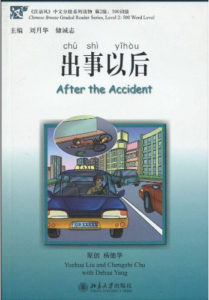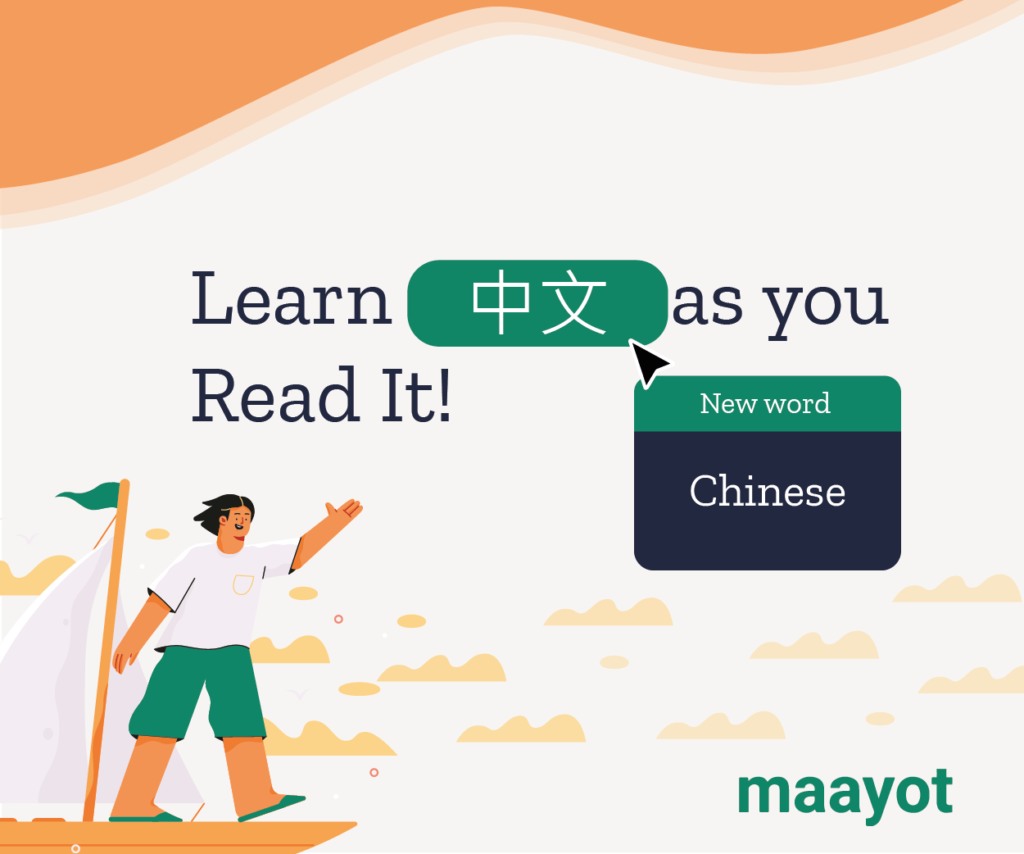At the time of this article, Chinese Breeze has four levels of graded readers. Level 1 assumes a knowledge of 300 base words, level 2 500 base words, level 3 750 base words, and level 4 1,100 base words.
Reading a level 2 Chinese graded reader would be feasible after about 1 year of college level Chinese.
A Summary of 《出事以后》 “After the Accident”
This is the story of a Chinese teacher in Bejing, 王老师 (Wāng Lǎoshī) ,who was struck by a car while she was riding home on her bike. She was found by a taxi driver who helped her to The People’s Hospital (人民医院).
The taxi driver figured out who her husband was by checking her cellphone, then told a nurse to call him to come to the hospital. In the meantime, the taxi driver hurried off before they could get his name.
The doctor informed her husband, 老孙 (Lǎo Sūn), that she needed to have surgery immediately because of the risk of blood clots. After six hours of exhausting surgery, the doctor informed Lao Sun that it might take some time for Wang Laoshi to regain consciousness.
During the recovery process, Lao Sun’s son, 孙力 (Sūn Lì) decided it would be best to seek out a care giver for his mother. A hospital attendant 小石 (Xǐao Shí) is hired. She helped clean and massage Wang Laoshi because the doctor said such stimulation would help in the recovery and reduce the chances that Wang Laoshi go into a vegetative state.
Eventually she regains consciousness to everyone’s great joy. During a chat one day, Xiao Shi causally mentioned that her son wanted a computer and as a way of expressing her gratitude, Wang Laoshi offered to give her son an older computer that she was replacing.
This leads to how Wang Laoshi discovers who helped her, but I don’t want to reveal the entire plot, get the book to find out the rest of the story!
How I Benefited from reading《出事以后》 “After the Accident”
When I was a high school student, I came across a German primer. Unfortunately, my teacher wasn’t the most interesting person, so this German primer was such a godsend! It started out with lots of simple words and cognates and chapter by chapter I was able to read more complex stories. And it was fun! No contrived dialogues or grammar exercises.
Now I’m not asserting that you should toss your Chinese textbook in the trash and just read books, but extensive reading is a great way to quickly build upon the foundation that your Chinese textbook give you.
What I like about Chinese Breeze graded readers is that they are original stories and give you a glimpse into life in China. Each book also seems to have a particular emphasis. In 《出事以后》 “After the Accident” I liked that I was picking up some medical terminology.
For the most part, I found this a relative easy read, perhaps because I have already read several level 2 books. I believe this is the proof in the pudding that extensive reading is of great benefit.
Features of this Chinese graded reader
I should have taking better note of some minor typos, I believe I ran across two or three. But the one typo that I definitely remember is a footnote for 救 (jiù – save, help, rescue). The index is 81, but it is reference in the text more than once as 80. So, I wish they would have done a better job of proof reading.
In addition to the original story line, each book has an audio CD. You can listen to the story in a slow and regular pace. I listened to the story at the slow pace while driving and was pleased at how much I could understand. I recommend that you read and then listen to the story, or even read while listening. Building up listening skills is very important.
After reading a chapter, take a moment to look at the review questions for the chapter and try to answer the questions. This will help you know if your understanding is correct.
When you finish reading the book, try your hand at the “global understanding” questions and even the vocabulary questions. Both are designed to help you recall the story as a whole unit.
Keep at it! Reading books such as 《出事以后》 “After the Accident” will help you better retain what you are learning in class. In fact, I often mention to my Chinese teacher, what I’m reading.




